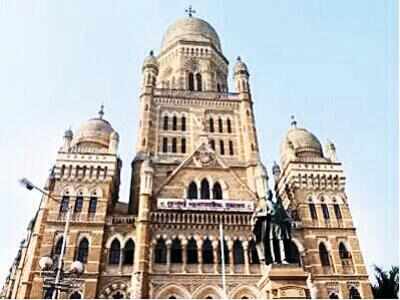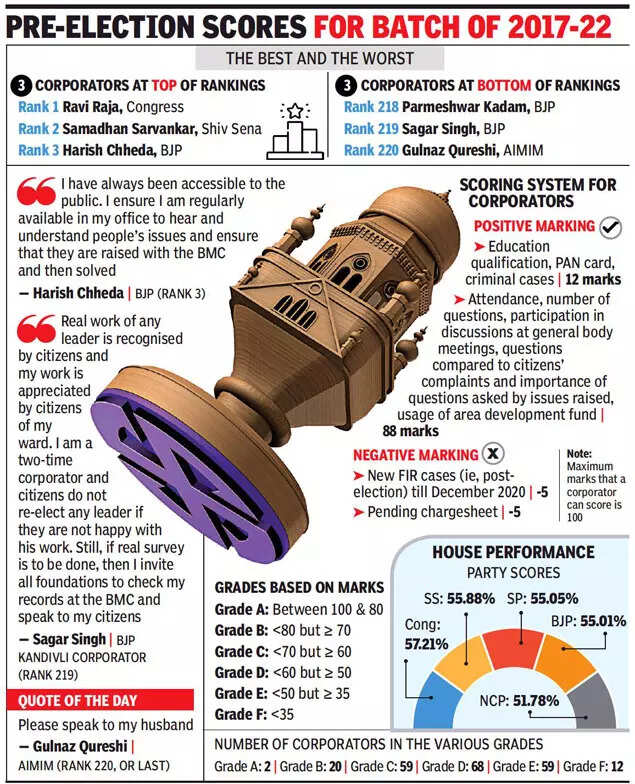Top Searches
- News
- City News
- mumbai News
- Mumbai: Only 2 corporators get an ‘A’ in Praja performance report
Mumbai: Only 2 corporators get an ‘A’ in Praja performance report

Corporators in the current BMC house were elected in 2017.
MUMBAI: Ahead of the BMC election scheduled early next year, an analysis of the performance of 220 corporators by NGO Praja Foundation shows only two of them received an A grade for the period 2017-2021 in the scoring system devised by the citizen watchdog.
While 198, or 90%, of councillors received C, D, E and F grades, there were 20 who made it to B grade. The Praja report said the rankings showed there was a need for major improvement in corporator performance.

Grade A is given for scores from 80 to 100, B from 70 to 80, and C to F grades are all for various scores under 70.
Opposition leader Ravi Raja of the Congress was ranked first. The five-term corporator said taking people’s issues before the administration repeatedly ensured his top position.
AIMIM corporator from Bharatnagar in Bandra-Kurla Complex (BKC), Gulnaz Qureshi, stood last. The public representative refused to speak on anything, only saying all questions would be answered by her husband. Salim, Qureshi’s husband, said they did not believe in “these report cards” and were confident they would win the election again for the work that they had done in the past years.
Samadhan Sarvankar of the Shiv Sena, a first-time corporator from Prabhadevi, said he felt one of the reasons he was in the top three was that he not just raised civic issues but also ensured that these were solved.
Corporators in the current BMC house were elected in 2017.
Attendance of corporators in committee meetings dropped from 82.15% in 2017-2018 to 73.70% in 2019-20.
“As citizens’ representatives, it is expected that corporators will raise questions with the municipal corporation about complaints made by citizens,” Praja Foundation director Milind Mhaske said.
While the NGO analyses yearly performance of corporators, last year the Covid-19 pandemic arrived and Praja decided to bring out a consolidated report card which entails data covering the performance of councillors from 2017 to 2021.
Though there are 227 corporators, the performance of only 220 was analysed as the mayors and some corporators who had not completed a certain period were not analysed.
The report called for more meetings through the use of technology, greater coordination between stakeholders, and decentralisation of powers.
“Now that BMC elections are around the corner, we need to understand how our current elected representatives have performed in the last term and this can act as an opportune moment to introspect on the performances,” Praja Foundation founder amd managing trustee Nitai Mehta said.
Praja data showed that four more meetings per month were held during the pandemic months compared to the monthly average in previous years. In 2019-2020, the monthly average was 22 ward meetings, whereas when technology was used from October 2020 to March 2021, it went up to 26 meetings.
While 198, or 90%, of councillors received C, D, E and F grades, there were 20 who made it to B grade. The Praja report said the rankings showed there was a need for major improvement in corporator performance.

Grade A is given for scores from 80 to 100, B from 70 to 80, and C to F grades are all for various scores under 70.
Opposition leader Ravi Raja of the Congress was ranked first. The five-term corporator said taking people’s issues before the administration repeatedly ensured his top position.
AIMIM corporator from Bharatnagar in Bandra-Kurla Complex (BKC), Gulnaz Qureshi, stood last. The public representative refused to speak on anything, only saying all questions would be answered by her husband. Salim, Qureshi’s husband, said they did not believe in “these report cards” and were confident they would win the election again for the work that they had done in the past years.
Samadhan Sarvankar of the Shiv Sena, a first-time corporator from Prabhadevi, said he felt one of the reasons he was in the top three was that he not just raised civic issues but also ensured that these were solved.
Corporators in the current BMC house were elected in 2017.
Attendance of corporators in committee meetings dropped from 82.15% in 2017-2018 to 73.70% in 2019-20.
“As citizens’ representatives, it is expected that corporators will raise questions with the municipal corporation about complaints made by citizens,” Praja Foundation director Milind Mhaske said.
While the NGO analyses yearly performance of corporators, last year the Covid-19 pandemic arrived and Praja decided to bring out a consolidated report card which entails data covering the performance of councillors from 2017 to 2021.
Though there are 227 corporators, the performance of only 220 was analysed as the mayors and some corporators who had not completed a certain period were not analysed.
The report called for more meetings through the use of technology, greater coordination between stakeholders, and decentralisation of powers.
“Now that BMC elections are around the corner, we need to understand how our current elected representatives have performed in the last term and this can act as an opportune moment to introspect on the performances,” Praja Foundation founder amd managing trustee Nitai Mehta said.
Praja data showed that four more meetings per month were held during the pandemic months compared to the monthly average in previous years. In 2019-2020, the monthly average was 22 ward meetings, whereas when technology was used from October 2020 to March 2021, it went up to 26 meetings.
FacebookTwitterLinkedinEMail
Start a Conversation
end of article

